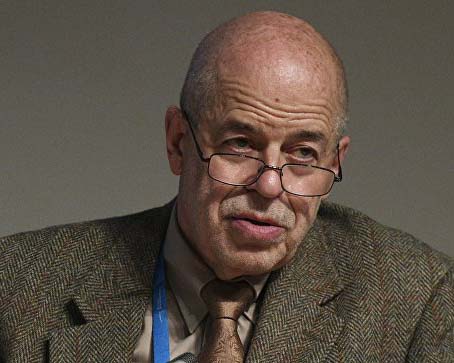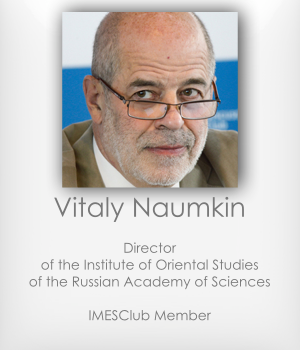New Syria peace talks go-between is a fixer trusted by the Kremlin
 IMESClub's Council Chairman, one of the greatest world experts on the Middle East was named this week as a mediator in the Syrian peace talks and advisor to Staffan de Mistura.
IMESClub's Council Chairman, one of the greatest world experts on the Middle East was named this week as a mediator in the Syrian peace talks and advisor to Staffan de Mistura.
We share the article by Reuters on the matter.
A Russian academic named this week as a mediator in the Syrian peace talks is an acclaimed expert on the Arab world with the trust of the Kremlin, a sign of the influence Moscow has won at the negotiating table after a five-month military campaign.
Staffan de Mistura, the United Nations envoy on Syria, said he had appointed Russia's Vitaly Naumkin, 70, as a new consultant to support him in brokering peace talks in Geneva between the sides in Syria's civil war. De Mistura said he also wants to appoint an American, who has yet to be named.
The posts reflect the roles of the Cold War-era superpowers as co-sponsors of peace talks that began this week in Geneva, with Moscow a leading supporter of President Bashar al-Assad and Washington friendly with many of his enemies.
Naumkin's position is likely to ensure that Moscow retains its clout at peace talks, even as President Vladimir Putin has announced he is pulling out most of his forces after an intervention that tipped the balance of power Assad's way.
Reuters spoke to nine people who know Naumkin, and all described a talented and well-connected scholar who speaks fluent Arabic and has rich experience mediating in conflicts.
He has close working relationships with Russia's leaders, and describes himself as a protege of Yevgeny Primakov, a former Russian spy chief, foreign minister and prime minister who once served as an architect of Soviet policy in the Middle East and later as an informal mentor to President Vladimir Putin.
Naumkin did not reply to a Reuters request for an interview, but acquaintances said his views were likely to reflect Russia's policies.
"He has a political line, it's our good political line," said Alexei Malashenko, a long-standing Naumkin acquaintance and scholar in residence at the Moscow Carnegie Center think tank.
TIES TO OFFICIALS
Another person who knows Naumkin, who gave an assessment of his role on condition of anonymity, described him as a talented academic who would defer to senior Russian officials on policy.
Several of the people who spoke to Reuters said Naumkin was in regular contact with Mikhail Bogdanov, Russia's deputy foreign minister and presidential Middle East envoy.
De Mistura nevertheless said Naumkin's job would be to help the U.N. mediation team, not serve Russian interests: "He reports to me, not to his own mother country."
Born in the Ural Mountains, Naumkin studied Arabic language and history at Moscow State University, before serving for two years in the Soviet army teaching Arabic to military interpreters.
He gained a reputation as an outstanding simultaneous interpreter and was called on to translate at high-level meetings between Soviet officials and Arab leaders. It was in this role that he built up a rapport with Primakov, whom he met in Cairo in the 1960s.
Primakov later invited him to work as an academic at the Institute of Oriental Studies in Moscow, according to Naumkin's own account. Naumkin did pioneering research into Socotra, an island between Yemen and Somalia, and spent periods living in Yemen and Egypt.
"He knows the Middle East not by hearsay, not from inside an office, but he's lived within it," said Alexander Knyazev, a Kazakhstan-based analyst who has known Naumkin for years.
In the early 1990s, Naumkin facilitated back-channel negotiations between rival sides in a civil war in the mainly Muslim ex-Soviet state of Tajikistan.
Naumkin arrived in the Tajik capital at the height of the fighting together with Harold Saunders, a former U.S. Assistant Secretary of State. Unsolicited, they offered their services as mediators to the Tajik leader.
When he accepted, they went to the Tajik foreign minister's house and slaughtered a sheep to celebrate, according to Kamoludin Abdullaev, a Tajik researcher who was present.
Naumkin's role in the talks was to make sure the opposition's views were heard.
"He was very assertive. The ... negotiations ended successfully," said Mars Sariyev, a former Kyrgyz diplomat who took part on the talks.
SYRIA MEDIATION
Naumkin has already played a back-room role in Syria negotiations, coordinating two rounds of talks in Moscow, backed by the Russian foreign ministry, to try to unite some of Syria's disparate opposition.
Those talks produced no major breakthrough, though not through any fault of Naumkin's, according to Nikolai Sukhov, an Arabist scholar and former student of Naumkin.
People who know Naumkin said he would be unflagging in his efforts to broker a solution in Geneva, would be on good terms with both sides and would not let emotion or frustration get in the way, even if the talks falter.
Western diplomats say it may be useful to have Naumkin in the room at the talks. One said it would encourage the Syrian government delegation to stay at the table despite its reluctance to sit down with its opponents.
Another said it could also be reassuring to the opposition, since the Kremlin has leverage over Damascus: “If the hypothesis is that the Russians will be putting pressure on the regime, maybe it is good to have this guy there.”
(Additional reporting by Olga Dzubenko in BISHKEK, Jack Stubbs and Dmitry Solovyov in MOSCOW, Olzhas Auyezov in ALMATY and Tom Miles and Suleiman Al-Khalidi in GENEVA; writing by Christian Lowe; editing by Peter Graff)
Russia stakes out Iranian market
 Over the past few weeks, Russia has taken steps to develop its trade and economic ties with Tehran, which plunged to a record low of $1.59 billion last year. In 2013, according to Russian Minister of Energy Alexander Novak, this amounted to a reduction of 31.5%, a consequence of the unilateral US and EU sanctions imposed in mid-2012, which forced companies such as Lukoil and Gazprom Neft to leave the Iranian market.
Over the past few weeks, Russia has taken steps to develop its trade and economic ties with Tehran, which plunged to a record low of $1.59 billion last year. In 2013, according to Russian Minister of Energy Alexander Novak, this amounted to a reduction of 31.5%, a consequence of the unilateral US and EU sanctions imposed in mid-2012, which forced companies such as Lukoil and Gazprom Neft to leave the Iranian market.
The situation should have changed with the agreement reached between Russian President Vladimir V. Putin and his Iranian counterpart, Hassan Rouhani, during the SCO Summit in Bishkek in September 2013, which caused a stir and under the terms of which 500,000 barrels per day of Iranian oil would be delivered in exchange for Russian goods and equipment. By rough estimates, that is 12% of the oil extractable daily in Iran.
Nothing was known, however, about concrete steps to put this agreement into practice until Foreign Minister Sergey Lavrov’s visit last December to Tehran, during which ways to implement it were discussed. One of the items on the table appears to have been the price of the oil, given Moscow’s request for a discount. It was clear that, with the sanctions still standing, the problem would also likely be who would purchase the oil and make the payments and how, considering the threat of US sanctions. According to the Russian newspaper Kommersant, one of the possible options initially suggested was that Rosneft buy the oil. But at the beginning of April the Ministry of Energy decided to choose an authorized trading company which, as the newspaper source explained, “will be a company registered in Russia that — contrary to Rosneft —does not trade on the world market and is thus immune from pressure.”
While it was undeniable that the Iranian side was interested in breaking the trade embargo and obtaining the goods it needed, analysts had to ponder the reasons guiding the Russian side. It was evident that Moscow was not moved by an urgent need to obtain energy carriers from its Middle Eastern partner. During one of the talk shows on the Russian TV channel RBC, participants were even asked the question: “Why should Russia buy Iranian oil?” Actually, back in February, Iranian Ambassador to Russia Mehdi Sanai suggested that, in the negotiations on the supply of Iranian oil in exchange for Russian goods, Moscow and Tehran might agree to invest in the construction of a second unit at the nuclear power plant in Bushehr.
Many Russian analysts were convinced that Russia, predicting the possibility of, if not a full, then at least a partial normalization of Iran's relations with the West and seeing a sharp increase in interest in Iran in Western business circles, set as a first priority the task to “stake out” a place for itself in the Iranian market. While the range of Russian products to be delivered to Tehran in exchange for oil is generally known, though not precisely defined (e.g., metallurgical products, machinery, power equipment and other goods), the basic parameters of the Iranian oil deliveries to Russia have not yet been revealed. It is unknown whether the sides have managed by now to resolve all the issues linked to this deal and come to a final agreement on its implementation.
Read the whole article: http://www.al-monitor.com/pulse/originals/2014/05/iran-russia-oil-exchange-goods-cooperation.html#ixzz31cymuXI6











